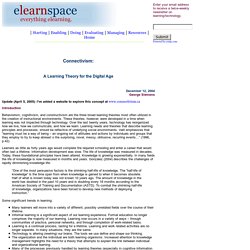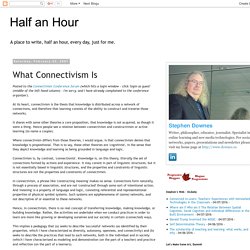

Connectivism: A Learning Theory for the Digital Age. Connectivism: A Learning Theory for the Digital Age December 12, 2004 George Siemens Update (April 5, 2005): I've added a website to explore this concept at www.connectivism.ca Introduction Behaviorism, cognitivism, and constructivism are the three broad learning theories most often utilized in the creation of instructional environments.

Learners as little as forty years ago would complete the required schooling and enter a career that would often last a lifetime. “One of the most persuasive factors is the shrinking half-life of knowledge. Some significant trends in learning: Many learners will move into a variety of different, possibly unrelated fields over the course of their lifetime. Background Driscoll (2000) defines learning as “a persisting change in human performance or performance potential…[which] must come about as a result of the learner’s experience and interaction with the world” (p.11).
Driscoll (2000, p14-17) explores some of the complexities of defining learning. Conclusion: What Connectivism Is. Posted to the Connectivism Conference forum (which hits a login window - click 'login as guest' (middle of the left-hand column) - I'm sorry, and I have already complained to the conference organizer).

At its heart, connectivism is the thesis that knowledge is distributed across a network of connections, and therefore that learning consists of the ability to construct and traverse those networks. It shares with some other theories a core proposition, that knowledge is not acquired, as though it were a thing. Hence people see a relation between connectivism and constructivism or active learning (to name a couple). Where connectivism differs from those theories, I would argue, is that connectivism denies that knowledge is propositional. That is to say, these other theories are 'cognitivist', in the sense that they depict knowledge and learning as being grounded in language and logic.
Connectivism is, by contrast, 'connectionist'. Response to comments by Tony Forster Response (1) to Bill Kerr. 2013 05 30 edmunston. Dominique_provot.pdf. Le connectivisme – sketchnote. Un petit sketchnote sur le connectivisme à partir de lectures d’articles de Siemens et Downes.

Je lis ce mot depuis quelques temps, notamment dès qu’il s’agit de moocs, et j’avais fini par croire qu’il s’agissait juste d’inviter les apprenants à se balader et à se faire un parcours dans différentes ressources. Les hypothèses du connectivisme sont en fait assez radicales, et remettent en cause certaines représentations qui nous accompagnent depuis le behaviorisme jusqu’au socio-constructivisme. Dans les dessins et textes qui suivent, je traduis "learning" par "apprentissage". J’ai bien conscience que ce n’est pas tout à fait la même chose, mais je n’ai pas mieux ! Cc by – cliquer pour agrandir – réalisé avec Krita Les choses ont changé A l’origine du connectivisme, un premier constat : les connaissances ont une durée de vie de plus en plus courte.
Parallèlement, les apprentissages changent de forme. Un point commun de nos apprentissages est la place qu’y occupe la technologie. Like this: